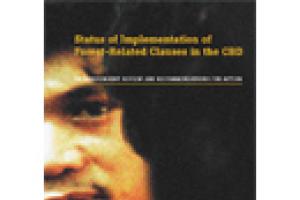Have you ever seen "Ghost Busters", the movie? Thanks to the magic of movies, that silly story, perhaps the brainchild of a superstitious youngster became a motion picture. Many kids and a few adults maybe even believed for a moment that ghosts are for real. This is pretty close to what happened in New Zealand, at the "Experts Meeting on Planted Forests".
To many of us, this is just absurd, planted forests do not exist. But, is that a reason for not being scared?
- Well, I don't know what I saw, but I was scared!
Aotearoa / New Zealand
Bulletin articles
4 March 2003
Last year I attended a conference in Capetown on the above subject, where the push appeared to be for the involvement of the Private Sector in the ownership and management of Plantations. As an Indigenous person from a country with huge areas of monocultural exotic plantations, I had never thought much about the ownership of these plantations. In my country they had a history of state ownership, although recent times had seen the sale of some of these plantations. Ethically, I am opposed to the privatization of state assets by any government and regard it as a false economic measure.
Bulletin articles
11 February 2003
The Green Party is concerned at the reported aggressive comments of US company, which outline its plans to grow genetically engineered (GE) redwood trees in New Zealand.
The timber company, Soper-Wheeler, has said it intends to start planting genetically engineered seedlings from the US in its South Island plantation in August. This is despite New Zealand's moratorium on commercial release of GE not being due to be lifted till October. The company says the harvested logs would be sent to mills in the US.
Bulletin articles
7 September 2002
The weekend of the 21st and 22nd of September PIPEC (Pacific Indigenous People’s Environment Coalition) held a workshop on the Underlying Causes of Deforestation and Forest Degradation. The workshop was opened by the new Conservation Minister for New Zealand, Chris Carter, and had representatives from most of the Pacific nations' communities here in Aotearoa, along with Maori representation. Nearly all of the Pacific academics working in the tertiary sector attended, as did a representative of Siosiomaga Society from Samoa.
Bulletin articles
14 May 2002
In April, the fifth edition of the Roger Award took place. This prize is given to the worst transnational corporation operating in Aotearoa/New Zealand and is organized by the Campaign Against Foreign Control of Aotearoa (CAFCA) and GATT Watchdog, two local activist/campaign organizations.
Articles
15 April 2002
In all of the debate over what is (or is not) a forest, the issue of an individual country’s commitment to the Convention on Biological diversity (CBD) has been overlooked by many. We need to remember that in signing and ratifying their commitment to the CBD, countries commit to increasing their forest cover as a measure of protecting biodiversity. The Global Forest Coalition produced a report on several countries' commitment to the CBD which was presented at the sixth Conference of the Parties in The Hague.
Other information
18 March 2002
Commissioned by the Global Forest Coalition
This report is based on 21 country case studies, including Australia, Brazil, Cameroon, Canada, Chile, Colombia, Czech republic, Ghana, India, Indonesia, Kenya,Malaysia, the Netherlands, New Zealand/Aotearoa, Papua New Guinea, Russia, South Africa, Suriname, Uganda, United Kingdom, and Uruguay
Bulletin articles
16 November 2000
The recent publication in the USA of a book, detailing a conspiracy between government, industry, and various public relations firms to discredit environmentalists in New Zealand, has produced surprise among environmental and official circles in that country.
Articles
16 October 2000
While genetic engineering applied to food production is provoking concern among consumers and citizens and many scientists express their doubts and criticism in relation to it, big food, forestry and energy corporations are engaged in developing genetically modified trees, expected to be able to grow faster and to contain components desired by industry. (see WRM Bulletins 26 and 27)
Bulletin articles
18 June 2000
A 30-year campaign led by environmentalist organizations in New Zealand (see WRM Bulletin 30) has at last reached its goal, since the new government has recently introduced legislation to stop the logging of publicly-owned temperate rainforests at the West Coast, and to transform them into national parks and other conservation reserves.
Bulletin articles
18 April 2000
The new Government of Aotearoa -a coalition supported by the Greens- has banned the cutting of indigenous beech trees (and soon probably Rimu and other species), because of the enormous pressure on the country's remaining areas of natural forest, which include temperate rainforest and temperate dryforest.
Bulletin articles
20 January 2000
Environmental NGOs are celebrating the success of the newly elected New Zealand government in forcing the State owned logging company, Timberlands, to withdraw its plans to log extensive areas of beech rainforests on the west coast of the country's south island.

